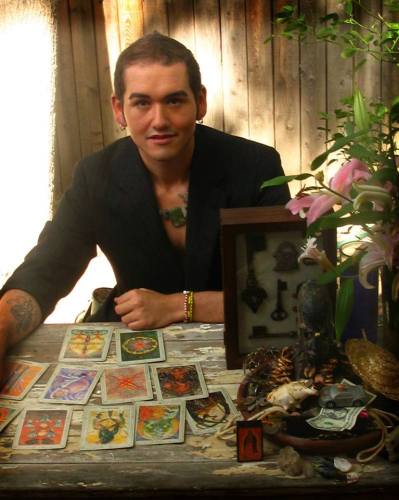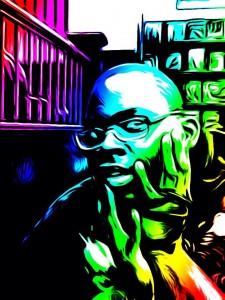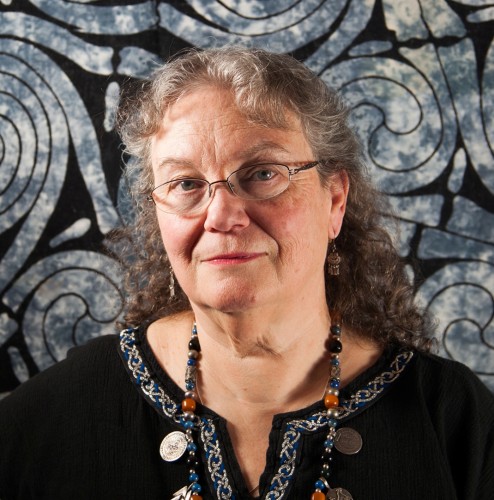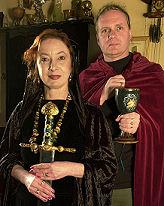[Today we welcome guest writer Lilith Dorsey M.A. Dorsey hails from many magickal traditions, including Celtic, Afro-Caribbean, and Native American spirituality. Her traditional education focused on Plant Science, Anthropology, and Film at the University of R.I, New York University and the University of London, and her magickal training includes numerous initiations in Santeria, also known as Lucumi, Haitian Vodoun, and New Orleans Voodoo. Lilith Dorsey is a Voodoo Priestess and is the editor/publisher of Oshun-African Magickal Quarterly, filmmaker of the experimental documentary Bodies of Water:Voodoo Identity and Tranceformation, author of Voodoo and Afro-Caribbean Paganism, 55 Ways to Connect to Goddess, and The African-American Ritual Cookbook, and choreographer for jazz legend Dr. John’s “Night Tripper” Voodoo Show. You can find on her blog Voodoo Universe.]
Possession seems to be all the rage lately, well maybe it always was. People are in awe of the power to connect with the divine. As a Voodoo/Vodou practitioner and priestess for over two decades I have seen many possessions both real and exaggerated. I have seen possession as a way to connect, to heal, to receive blessed messages from the divine, and unfortunately I have also seen people feign trance in an effort for attention.
One particularly powerful ritual I attended many years ago was for Ogou, the Vodou Lwa of Iron and the white hot forge. Ogou is a warrior, and I knew the night was going to be an interesting one. I stepped on a carpet tack fairly early in the evening, and the blood coming from my foot was a “red flag” for me.
![[Photo Credit: Sam Mugraby, Photos8.com CC via Wikimedia]](https://wildhunt.org/wp-content/uploads/2015/05/512px-Candles_flame_in_the_wind-other-500x333.jpg)
[Photo Credit: Sam Mugraby, Photos8.com CC via Wikimedia]
Another incident that I recall from that night was even more powerful. I probably wouldn’t even be speaking of it had it not occurred so many years ago and with such healing results. The next person to wield the machete had been experiencing some powerful transformations the week before. Unknown to most of us, he had tried to take his own life with a blade only days before. As he held the ritual iron, he later said, that he felt not the damage the weapon could do, but only the good. This force had changed for him in that single moment to one of protection and healing. I am happy to say he is still with us today.
I have also been party to many ridiculous possessions. At one Lucumi (more commonly referred to as Santeria) ceremony in Harlem, a few of the women in attendance grabbed their breasts, shouted unintelligibly, and demanded everyone’s complete attention. Attending Santeros and Santeras called these “possessions” visitations by Santa Borraccha or Saint drunk woman.
Unfortunately, these type possessions are not limited to the Afro-Caribbean pantheon. One fond memory comes from a Pagan event where a friend and I listened to someone perform a session of amateur mediumship and, then, answer questions from the crowd. My friend fell asleep., Then, woke up several minutes later and said out loud, “This is crap.” That was one of the best moments ever – hands down.
These are humorous moments; however, they bring up real questions about spiritual possession. Who are we connecting with? Why? And, how are the safest ways to get there in a genuine and respectful way? Entire books can and have been written on this subject.
In anthropology the phenomenon of possession has been studied almost from its very beginnings. It is an elusive topic however, and how people create magick and meaning from it is always changing as well. Some like to academically classify it by its function, comparing it to a form of group therapy where public witnessing can perform a public good. There is an argument there, but for those who have actually been party to it, it is so much more than that.
Avant-Garde filmmaker, anthropologist and Vodou Priestess Maya Deren called possession the “white darkness,” and positioned it as the ultimate goal of practitioners. It is truly both a fusion and a blessing with and from the divine. For her it is about sacred thresholds and entrances.
As someone who has experienced it first hand, possession is a reciprocal, mutual, and inter-dependent abiding. A genuine blessing for those to watch and experience. Many of my colleagues feel the same, and I am fortunate enough to be able to share their experiences and thoughts about possession, proof, and prophecy with you here.

Lou Florez [Courtesy Photo]
I view the practice less as “possession” and more as form of spiritual incorporation. Meaning that the experience isn’t about the violation of my inner sense of sovereignty, or dispossession, but rather that Spirit and I become incorporated into each other. For a brief moment there is a permeability and a dissolution of the boundaries that signify my individuated sense of self and that space allows for the reunion to occur.
Author Diana L. Paxson, an elder of the Covenant of the Goddess,The Troth and the American Magic Umbanda House, pioneered the recovery of “high-seat” seidh, the oracular tradition of ancient Scandinavia. Paxson has written works on various aspects of Pagan spirituality, including Trance-Portation and The Way of the Oracle and Possession, Depossession and Divine Relationships. Paxson said:
Diana Paxson
The fact that possessory experiences are found in every culture suggests that the capacity to experience such states is wired into our brains. What distinguishes possession as an ecstatic religious experience from possession as a personality disorder is the community context. For it to be productive, however, both the medium and the supporting team need training. With practice, it can be a valuable addition to the ways in which we connect with our gods.
Gavin Bone and Janet Farrar, Pagan legends and authors of the upcoming Lifting the Veil: A Witches’ Guide to Trance-Prophesy, Drawing Down the Moon, and Ecstatic Ritual, said:
One of the things that has surprised us most since we went down the path of exploring Trance-Possession is the level of fear that surrounds it; and this is not just coming from people who are new to the pagan path. Often suggestions that what we are teaching is ‘dangerous’ in some way has some from experienced leaders and teachers in the community.
Janet Farrar & Gavin Bone
We believe that much of this fear stems from the christian culture which many of us have grown up in. As hard as many try, it still bubbles up from our own shadows on occasion when that emotive word ‘possession’ is used. We believe the lack of experience and knowledge gained from exploring this area derives from the Judeo-Christian influenced western occult tradition which has labeled it as ‘left hand path’; as something evil and to be avoided.
To compound this misunderstanding further, film and television has regularly portrayed possession as process of violation where a spirit attempts to ‘own’ us body and soul. The reality is of course very different as anyone who has experienced it knows. It is in fact a deeply spiritual act where the spirit does not so much ‘possess’ the body but briefly makes use of it with the permission of the individual. In over 20 years of teaching Trance-Possession both privately and publicly, we have yet to see any form of genuine possession which resembles anything like the imagery described by the church or the media. But what we have seen is disturbed individuals in a psychological fugue state, which is very different to a genuine case of ecstatic communion with the divine – true possession.

Tehron Gillis [Courtesy Photo]
The term is misleading. Ownership, to who does a body or its actions belong to are irrelevant. Possession is not a physical state of being but a settlement between the self within and the self without on a common goal that neither can accomplish without the grace of the other. The cup is without purpose without water, the water is without form without the cup. Only when they are in service wholly to each other can they accomplish something greater.
Who knows where possession will take us next? At best it is a transformative ride for both the horse and rider, or human and Gods respectively. May your rides be smooth, informed, and lead you just where you need to go.
The Wild Hunt is not responsible for links to external content.
To join a conversation on this post:
Visit our The Wild Hunt subreddit! Point your favorite browser to https://www.reddit.com/r/The_Wild_Hunt_News/, then click “JOIN”. Make sure to click the bell, too, to be notified of new articles posted to our subreddit.


Beautifully written. Thank you for the insight.
Very insightful indeed.
On a personal note I saw Dr. John perform live at LEAF a few years ago and it seemed to me at the time that the entire show was built around ritual. Now I know why. It was amazing to see, and the horn player (trombone I think) seemed to enter trance at one point and delivered an absolutely super human solo.
This kind of articles is very interesting to read, however, I would not have minded a little bit more info about how “disturbed individuals in a psychological fugue state” can be told apart from those experiencing “a genuine case of ecstatic communion with the divine – true possession”.
This is a good point to bring up. I have been in ceremonies where individuals have left with something quite dark attached to them.
It is important the individual knows what the energy is before accepting the visit.
I personally have never experienced anything ´Supernatural´ so it’s even harder for em to comprehend these kinds of things.
When you look down and your legs and feet are dancing and you are not doing it, it’s easier! 🙂
I disagree with Farrar and Bone. Possession *is* dangerous, and should be treated as such. This has nothing to do with positioning it as evil. Driving a car is not evil and is dangerous; a Learner’s Permit requires the new driver to be accompanied by someone experienced. Teaching people that possession is something they can do on their own (which some teachers and books do) is irresponsible in my opinion.
Thanks for your comment Deb, I was going to ask you your thoughts on the matter (but I know you have been busy;). I personally think possession is very complex, as complex as the individuals participating, and does require guidance and support.
I wonder if you would speak to the differences between “possession” and “channeling” and “aspecting.” To me, these are differences in degree of intensity, but I have lately seen writers talk about them as if they are entirely separate from one another.
Perhaps it is the writers, rather than the phenomena, that are driving these wedges, trying to distinguish their approach by underscoring its uniqueness?
This is a fascinating thread and here I think I can add something of value. My own training in serious incorporation (the word I prefer) was in a Brazilian context heavily influenced by Umbanda. My teacher explained he enabled a kind of incorporation where the medium/subject was not entirely gone because, he said, that way they could learn directly from the spirits rather than having someone else tell them what they said. The hardest part is staying out of the way during the experience.
Later I did quite a bit of research on Brazilian traditions and there is am apparently long standing debate as to which kind of incorporation is superior: being present or being ‘gone’ during the experience. Not surprisingly, each claims superiority for what they do.
My working guess is that these phenomena occur along perhaps several continua and so appear in many different forms, depending on the person’s openness, the nature of the entity, and the work to be done/message to be delivered.
I can only speak to my own definitions, but for me possession is as I feel Deren described it ” a white darkness,” and my white I am not implying race, but rather an artistic spectrum of spiritual possibility that comes together with one’s personal fortitude. The traditions that I practice all have different individual takes on where the I goes, and what is let in , all subjected to rigorous tests of validity both before and after the experience. For me channeling is a more direct conversation with an energy that very often is not divinity in my experience but an ancestor or recently departed spirit, the times I have seen people channel what they were calling divinity from pantheons that were not Lucumi, New Orleans Voodoo, or Haitian Vodou based ( which I am respectfully in word and deed treating separately, as I hold initiations in all 3) it was not subjected to any tests so I can not comment on that one way or another.But practically I can tell you that if someone baked a cake and if I can’t taste it or see it effectively,is it there? But like Schrodingers cat, who am I to say either way…Aspecting, from as I understand it, seems to be more of a spiritual guise … not sure any of this makes things clearer, I could go on for weeks, but that is my short answer..
A typology that is adequate would include additional distinguishing characteristics other than intensity.
I’m far from expert in this realm, but here’s an example: there is a form of possession regularly practiced in my Craft tradition, which Ivo Dominguez, Jr. has likened to the giant balloons in the Macy’s New Year parade. The priest or priestess is the anchor point of the deity, but the presence of the deity is not fully or even mostly contained within the body of the person on whom the deity has been drawn down. The deity is present within the circle outside the officer’s body and can be experienced directly (not merely observed) by everyone in the circle for as long as the ritual officer maintains the connection.
The ritual officer usually experiences a partial possession akin to aspecting or channeling, but the primary object of the possession is not to manifest deity directly, nor to be an intermediary between the entity and the group in the way that a trance medium or oracular priest would be. The object is to hold the deity sufficiently fully and long enough to enable others to be in direct contact with the deity in their own bodies and minds. Our tradition somehow figured out this method without guidance or an example, but it turns out to be known elsewhere.
I agree, Deborah. Concern about it can’t be dismissed as coming from Judeo-Christian influence. That fear is there for good reason and should serve as a very appropriate warning for those not ready, unwilling or unable to hold divine possession. I find the Farrar/Bone perspective troublesome.
What bemuses me is an implied disjunction between Judeo-Christian influence and possession. Pentecostals are quite Christian and seek (usually successfully) to be possessed by the Holy Spirit every Sunday.
I thought of Pentecosrals and charismatics when I read what Farrar/Bone wrote 🙂 But, the Pentecostals are a pretty small segment compared to the rest. The idea of spirit possession being a good and welcomed event is alien to so many of those who believe it can happen. Then there’s the segment who don’t believe in it.
This article was merely an overview and not in-depth, but I was still troubled by Farrar/Bone including what can be construed as a somewhat casual attitude about a subject with serious implications.
Pentecostals are only the most spectacular example. I’ve seen adult baptism ceremonies where it seems the baptee is being wired for God.
Why does Dorsey’s bio conflate all of those ATRs into one? They’re not.
Lilith provided us with the language for her bio. She has been reading the comments here and may respond herself. If not, you can reach her through her blog for clarification and a better explanation of her practice.